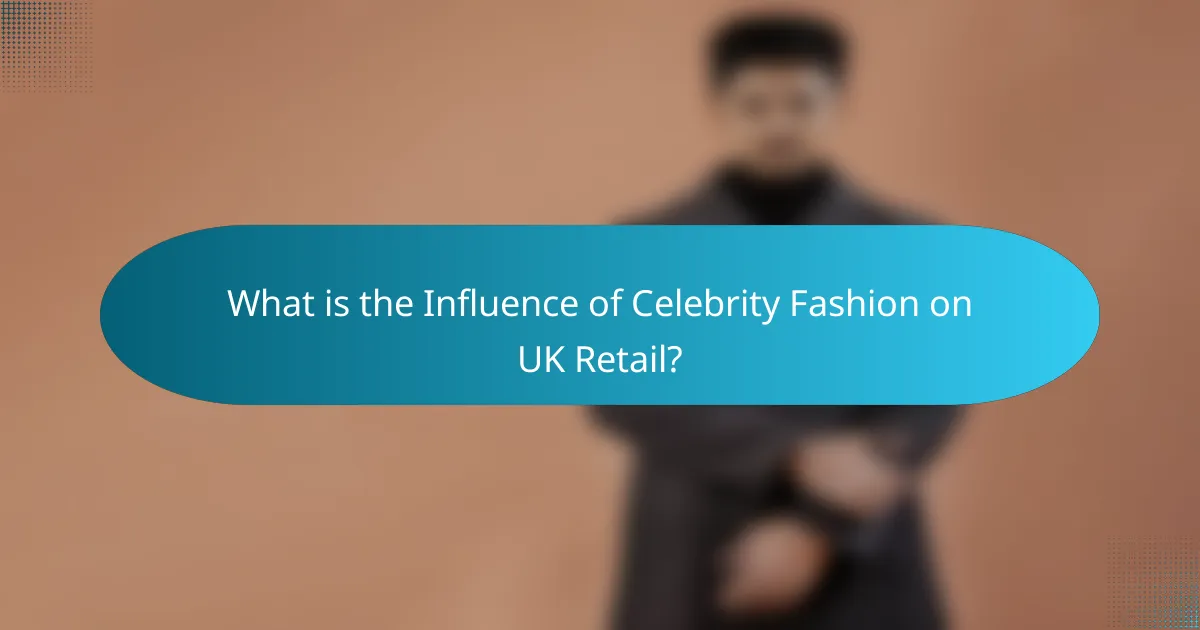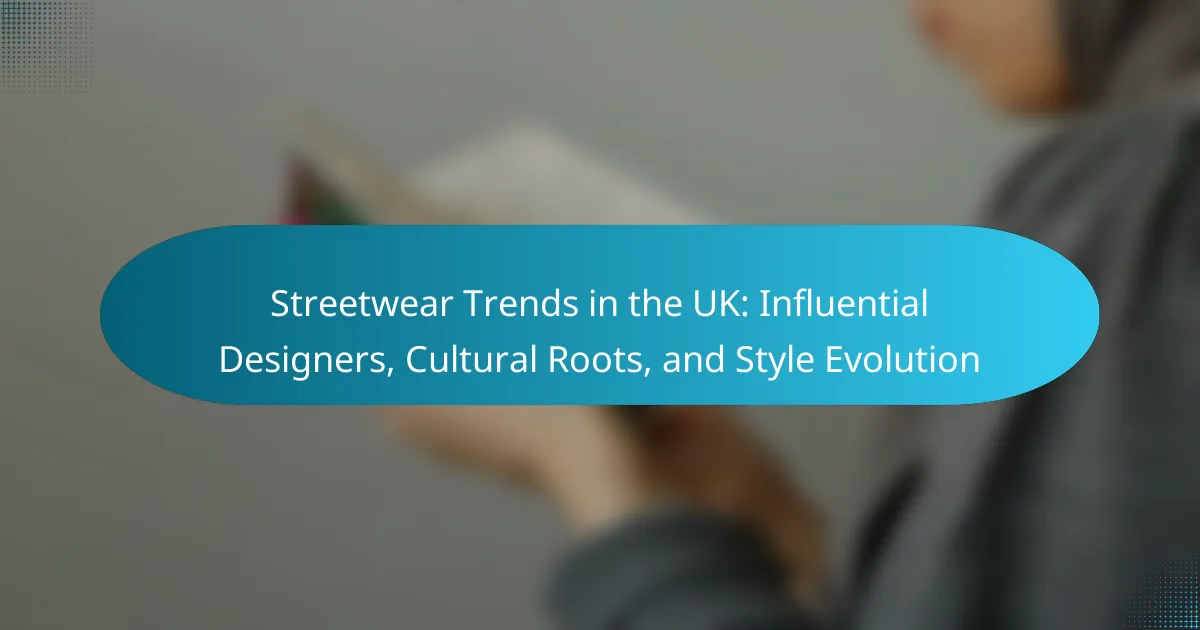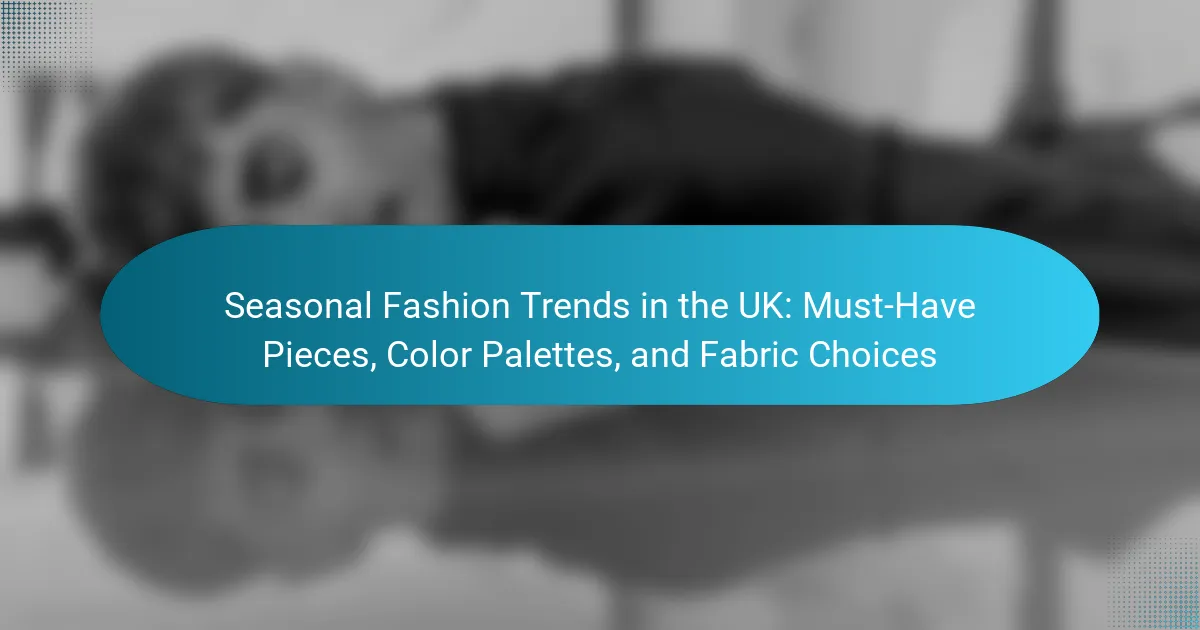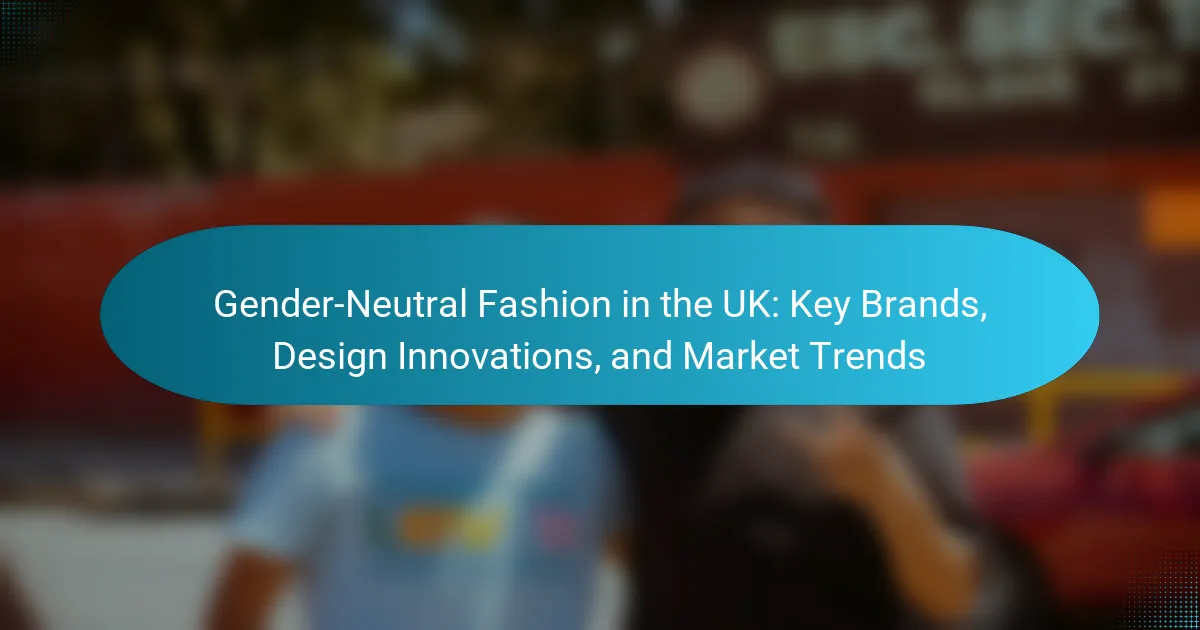
What is the Influence of Celebrity Fashion on UK Retail?
Celebrity fashion significantly influences UK retail by driving consumer purchasing decisions. Celebrities often set trends that resonate with the public. Their endorsements can lead to increased sales for specific brands. For instance, when a celebrity wears a particular outfit, retailers often see a spike in demand for similar styles. According to a study by Mintel, 42% of UK consumers are influenced by celebrity endorsements when shopping. This trend leads to collaborations between celebrities and fashion brands, creating exclusive lines. Such partnerships often boost brand visibility and market share. Overall, celebrity fashion shapes consumer behavior and retail strategies in the UK.
How do celebrities shape fashion trends in the UK?
Celebrities shape fashion trends in the UK by influencing consumer preferences through visibility and endorsement. Their public appearances often highlight specific styles, which fans seek to emulate. For instance, social media platforms amplify their fashion choices, making them instantly accessible to a wider audience. A report by Mintel in 2021 indicated that 47% of UK consumers follow celebrity fashion trends. Collaborations between celebrities and brands further solidify these trends, as seen with Rihanna’s Fenty brand and its impact on streetwear. Additionally, red carpet events showcase high-fashion looks that set seasonal trends. Overall, celebrities serve as trendsetters, driving sales and shaping the fashion landscape in the UK.
What role do social media platforms play in this influence?
Social media platforms play a crucial role in influencing celebrity fashion trends in UK retail. They provide a space for celebrities to showcase their fashion choices directly to fans. This immediate access allows followers to engage with and emulate their favorite celebrities’ styles. Platforms like Instagram and TikTok enable viral trends to emerge quickly. For example, a celebrity’s outfit can gain widespread attention within hours, driving consumer interest. Additionally, brands leverage social media for targeted advertising based on trending styles. Research indicates that 70% of consumers are influenced by social media in their purchasing decisions. Thus, social media acts as a powerful catalyst in shaping retail trends and consumer behavior.
How does celebrity endorsement affect consumer behavior?
Celebrity endorsement significantly influences consumer behavior by enhancing brand credibility and increasing purchase intent. When a well-known figure promotes a product, consumers often perceive it as more trustworthy. Research indicates that 49% of consumers are likely to purchase a product endorsed by a celebrity they admire. This effect is particularly strong among younger demographics. Additionally, celebrity endorsements can create a sense of aspiration, motivating consumers to align their purchases with the lifestyles of their favorite stars. Brands leveraging celebrity endorsements often experience higher engagement and sales, as evidenced by a 20% increase in sales for companies that utilize such marketing strategies. Overall, the presence of a celebrity can effectively shift consumer perceptions and drive buying decisions.
Why are iconic looks significant in the context of retail?
Iconic looks are significant in retail because they drive consumer engagement and brand loyalty. These styles often become trendsetters, influencing purchasing decisions. For example, when a celebrity is seen wearing a particular outfit, it can lead to a surge in demand for similar products. Research shows that 70% of consumers are influenced by celebrity endorsements when shopping. Retailers leverage iconic looks to create marketing campaigns that resonate with target audiences. This strategy enhances brand visibility and fosters emotional connections with consumers. Ultimately, iconic looks can lead to increased sales and market share for retailers.
What are some examples of iconic celebrity looks that impacted UK retail?
David Beckham’s casual street style popularized sportswear in UK retail. His collection with H&M saw a significant increase in athleisure sales. Kate Moss’s bohemian aesthetic influenced fashion trends, leading to a rise in vintage clothing sales. Her collaboration with Topshop generated millions in revenue. The Duchess of Cambridge’s elegant outfits have boosted sales for British designers like Alexander McQueen. Her public appearances often lead to sell-out items. Rihanna’s bold fashion choices have impacted fast fashion, particularly through her Fenty Beauty line. This brand’s inclusive approach has changed beauty retail dynamics.
How do these looks translate into retail sales and brand popularity?
Celebrity fashion looks significantly impact retail sales and brand popularity. When celebrities endorse specific styles, they create trends that consumers want to emulate. For instance, a study by the NPD Group found that 40% of consumers are more likely to purchase clothing worn by celebrities. This influence drives increased traffic to retail stores and online platforms.
Moreover, brands that partner with celebrities often see a spike in sales. For example, Rihanna’s collaboration with Puma led to a reported 20% increase in sales for the brand. The visibility and desirability of celebrity-endorsed items enhance brand recognition and loyalty.
In summary, celebrity fashion looks translate into retail success through trend creation and strategic partnerships, leading to higher consumer engagement and sales.
What are the key brand partnerships formed with celebrities?
Key brand partnerships formed with celebrities include collaborations with major fashion and beauty brands. For example, Rihanna partnered with Puma to create the Fenty x Puma line, which significantly boosted Puma’s sales. Beyoncé has collaborated with Adidas for her Ivy Park collection, impacting both brand visibility and revenue. Additionally, George Clooney’s partnership with Nespresso has been instrumental in enhancing the brand’s image. These partnerships leverage celebrity influence to drive consumer engagement and brand loyalty. Celebrity endorsements often lead to increased sales and market share for the brands involved.
How do these partnerships enhance brand visibility and credibility?
Partnerships enhance brand visibility and credibility by leveraging the influence of celebrities. When a brand collaborates with a well-known figure, it gains immediate access to that celebrity’s audience. This exposure can significantly increase brand recognition among potential customers. According to a 2021 study by NPD Group, 67% of consumers reported being more likely to purchase a product endorsed by a celebrity they admire. Additionally, celebrity partnerships often convey a sense of trust and quality. This is because consumers associate the celebrity’s reputation with the brand. As a result, brands can see a measurable increase in sales following such collaborations. Overall, these partnerships effectively boost both visibility and credibility in a competitive market.
What are the challenges brands face when collaborating with celebrities?
Brands face several challenges when collaborating with celebrities. One major challenge is aligning brand values with the celebrity’s public image. Discrepancies can lead to negative public perception. Another challenge is managing the celebrity’s availability and commitment. Celebrities often have busy schedules, which can disrupt marketing plans. Additionally, brands must navigate potential scandals involving the celebrity. Such incidents can adversely affect brand reputation. Finally, there are financial implications. Celebrity endorsements can be costly, and brands must ensure a positive return on investment. These challenges require careful planning and strategy to mitigate risks.
How does the celebrity fashion trend evolve over time?
Celebrity fashion trends evolve over time through shifts in cultural influences and personal styles. In the 1960s, celebrities like Twiggy popularized mod fashion, influencing mainstream retail. The 1980s saw icons like Madonna and Prince shape bold, extravagant styles. In the 1990s, grunge fashion emerged, led by celebrities such as Kurt Cobain. The rise of social media in the 2000s allowed celebrities to showcase their styles instantly, increasing their influence on fashion trends. Today, celebrities collaborate with brands to create exclusive lines, further shaping retail landscapes. Each era reflects societal changes, making celebrity fashion a dynamic aspect of culture.
What factors contribute to the changing nature of celebrity fashion?
The changing nature of celebrity fashion is influenced by several key factors. Social media platforms amplify celebrity visibility and impact fashion trends. Celebrities often collaborate with brands, creating exclusive lines that shape consumer preferences. Cultural shifts also play a role, as societal values influence style choices. The rise of sustainability has led celebrities to advocate for eco-friendly fashion. Fashion cycles are now quicker, driven by fast fashion and immediate consumer demand. Additionally, global events, such as award shows, set new trends that are rapidly adopted. This dynamic environment reflects the evolving relationship between celebrities and their audiences.
How do seasonality and cultural shifts impact these trends?
Seasonality and cultural shifts significantly impact fashion trends influenced by celebrities. Seasonal changes dictate consumer preferences for clothing styles, colors, and materials. For example, summer often sees a rise in demand for light fabrics and vibrant colors, while winter trends favor heavier materials and darker tones. Cultural shifts, such as increased awareness of sustainability, influence brands to adopt eco-friendly practices. This shift can lead to a preference for brands associated with ethical fashion. Additionally, significant cultural events, like award shows or fashion weeks, can spark trends that resonate with the public. For instance, a celebrity’s red carpet look may lead to an immediate surge in similar styles at retail. Overall, both seasonality and cultural shifts create a dynamic landscape that shapes consumer behavior in the fashion industry.
What are the current trends in celebrity fashion influencing UK retail?
Current trends in celebrity fashion influencing UK retail include the rise of sustainable fashion choices and the popularity of athleisure wear. Celebrities are increasingly endorsing eco-friendly brands. This shift reflects consumer demand for sustainability. Athleisure, combining comfort with style, is favored by many public figures. Collaborations between celebrities and high-street brands are also prevalent. These partnerships often lead to limited-edition collections. Social media plays a crucial role in promoting these trends. Influencers showcase celebrity styles, driving consumer interest and sales. The impact of these trends is measurable, with many retailers reporting increased engagement and sales in these categories.
How do sustainability and ethical fashion play a role in these trends?
Sustainability and ethical fashion significantly influence current trends in celebrity fashion. Celebrities increasingly endorse brands that prioritize eco-friendly practices. This shift aligns with consumer demand for responsible fashion choices. For instance, a study by McKinsey & Company highlighted that 67% of consumers consider sustainability when making a purchase. Ethical fashion also emphasizes fair labor practices, appealing to socially conscious consumers. Many celebrities collaborate with sustainable brands, enhancing their visibility and credibility. This trend is evident in partnerships between high-profile figures and eco-conscious labels. Overall, sustainability and ethical fashion are becoming essential components of celebrity influence in the retail landscape.
What emerging styles are celebrities currently endorsing?
Celebrities are currently endorsing oversized silhouettes and sustainable fashion. Oversized clothing has gained popularity, with stars like Billie Eilish and Harry Styles frequently sporting baggy fits. Sustainable fashion is also trending, with celebrities like Emma Watson and Leonardo DiCaprio advocating for eco-friendly brands. Streetwear continues to influence celebrity styles, as seen with figures like Travis Scott and Rihanna. Additionally, athleisure remains prominent, with endorsements from stars like Kim Kardashian and Gigi Hadid. These trends reflect a shift towards comfort and environmental consciousness in celebrity fashion.
What practical tips can retailers adopt to leverage celebrity fashion trends?
Retailers can leverage celebrity fashion trends by closely monitoring social media and celebrity appearances. They should analyze which styles and brands are gaining traction among influencers. Collaborating with celebrities for exclusive collections can attract attention and drive sales. Offering limited-time promotions on celebrity-inspired items can create urgency among consumers. Retailers should also utilize user-generated content featuring celebrities to enhance brand visibility. Engaging in partnerships with fashion bloggers can amplify reach and credibility. Hosting events that showcase celebrity styles can draw in customers and create buzz. Finally, retailers must be agile in adapting inventory to reflect changing trends inspired by celebrities.
The main entity of this article is the influence of celebrity fashion on UK retail. The article examines how celebrity endorsements shape consumer purchasing decisions and drive trends within the retail market. It highlights the role of social media in amplifying celebrity styles, the significance of iconic looks in enhancing brand visibility, and the impact of celebrity partnerships on sales and brand credibility. Additionally, it explores current trends in sustainable fashion and provides practical tips for retailers to effectively leverage celebrity fashion influences.


